04年高考全国卷英语听力材料录音原文
2004年、2005年广东高考自主命题英语(听力试题、答案 + 录音材料)
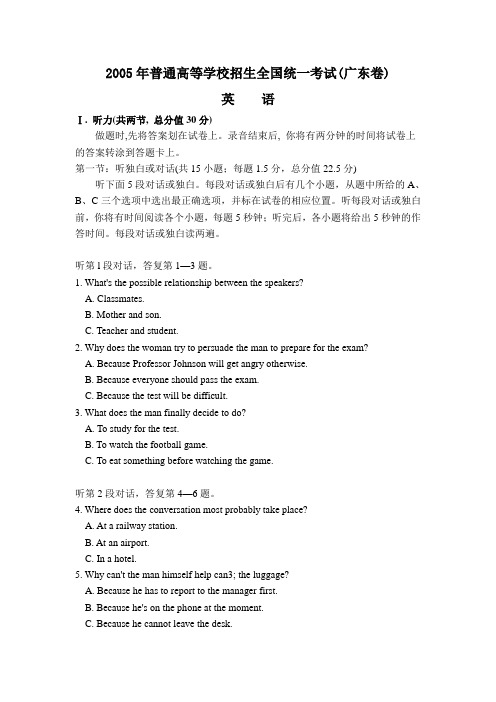
2005年普通高等学校招生全国统一考试(广东卷)英语Ⅰ. 听力(共两节, 总分值30分)做题时,先将答案划在试卷上。
录音结束后, 你将有两分钟的时间将试卷上的答案转涂到答题卡上。
第一节:听独白或对话(共15小题;每题1.5分,总分值22.5分) 听下面5段对话或独白。
每段对话或独白后有几个小题,从题中所给的A、B、C三个选项中选出最正确选项,并标在试卷的相应位置。
听每段对话或独白前,你将有时间阅读各个小题,每题5秒钟;听完后,各小题将给出5秒钟的作答时间。
每段对话或独白读两遍。
听第l段对话,答复第1—3题。
1. What's the possible relationship between the speakers?A. Classmates.B. Mother and son.C. Teacher and student.2. Why does the woman try to persuade the man to prepare for the exam?A. Because Professor Johnson will get angry otherwise.B. Because everyone should pass the exam.C. Because the test will be difficult.3. What does the man finally decide to do?A. To study for the test.B. To watch the football game.C. To eat something before watching the game.听第2段对话,答复第4—6题。
4. Where does the conversation most probably take place?A. At a railway station.B. At an airport.C. In a hotel.5. Why can't the man himself help can3; the luggage?A. Because he has to report to the manager first.B. Because he's on the phone at the moment.C. Because he cannot leave the desk.6. What will the man probably do?A. He will do nothing for the woman.B. He will find a way to help her.C. He himself will send her to the station.听第3段独白,答复第7—9题。
2004年高考试题 英语听力(湖北卷)录音稿

C. After seven.
第二节(共15小题;每小题1.5分,满分22.5分)
听下面5段对话或独白。每段对话或独白后有几道小题,从每题所给的A、B、C三个选项中选出最佳选项。听每段对话或独白前,你将有5秒钟时间阅读每小题。听完后,每小题将给出5秒钟的作答时间。每段对话或独白你将听两遍。
C. To buy a ticket for this train.
听第9段材料,回答第13至16题。
13. What is the probable relationship between the two speakers?
A. Husband and wife. B. Son and mother.
B. Because learning can help them improve their life.
C. Because learning can help them get university degrees.
20. According to the speaker, what is the most important for the new students?
A. $10. B. $ 6. C. $16.
听第7段材料,回答第8、9题。
8. What did the man do during these weeks?
A. He rode to the country several times.
B. He spent his holidays away from the city.
A. To buy some candles. B. To make a phone call.
2004年高考全国卷英语听力试题(含试题、听力音频、听力原文和答案)
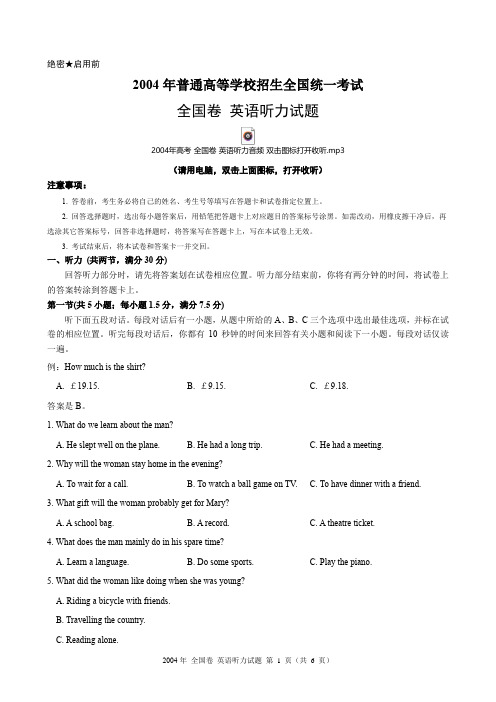
绝密★启用前2004年普通高等学校招生全国统一考试全国卷英语听力试题2004年高考 全国卷 英语听力音频 双击图标打开收听.mp3(请用电脑,双击上面图标,打开收听)注意事项:1. 答卷前,考生务必将自己的姓名、考生号等填写在答题卡和试卷指定位置上。
2. 回答选择题时,选出每小题答案后,用铅笔把答题卡上对应题目的答案标号涂黑。
如需改动,用橡皮擦干净后,再选涂其它答案标号,回答非选择题时,将答案写在答题卡上,写在本试卷上无效。
3. 考试结束后,将本试卷和答案卡一并交回。
一、听力(共两节,满分30分)回答听力部分时,请先将答案划在试卷相应位置。
听力部分结束前,你将有两分钟的时间,将试卷上的答案转涂到答题卡上。
第一节(共5小题;每小题1.5分,满分7.5分)听下面五段对话。
每段对话后有一小题,从题中所给的A、B、C三个选项中选出最佳选项,并标在试卷的相应位置。
听完每段对话后,你都有10秒钟的时间来回答有关小题和阅读下一小题。
每段对话仅读一遍。
例:How much is the shirt?A. £19.15.B. £9.15.C. £9.18.答案是B。
1. What do we learn about the man?A. He slept well on the plane.B. He had a long trip.C. He had a meeting.2. Why will the woman stay home in the evening?A. To wait for a call.B. To watch a ball game on TV.C. To have dinner with a friend.3. What gift will the woman probably get for Mary?A. A school bag.B. A record.C. A theatre ticket.4. What does the man mainly do in his spare time?A. Learn a language.B. Do some sports.C. Play the piano.5. What did the woman like doing when she was young?A. Riding a bicycle with friends.B. Travelling the country.C. Reading alone.第二节(共15小题;每小题1.5分,满分22.5分)听下面5段对话或独白。
2004年全国医学博士统一考试英语听力录音文本
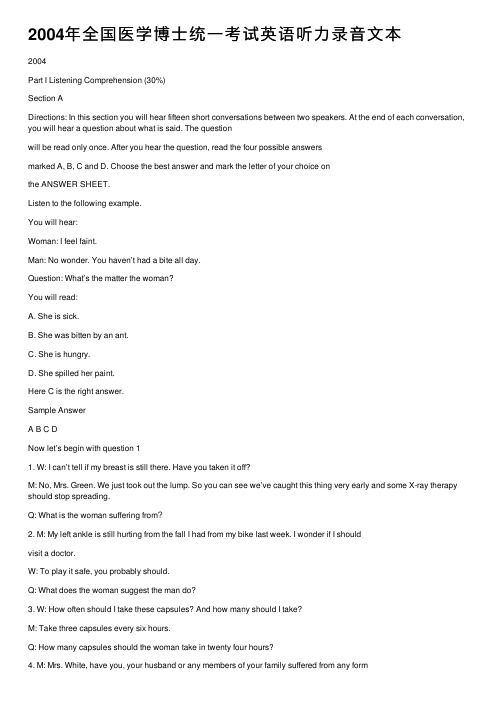
2004年全国医学博⼠统⼀考试英语听⼒录⾳⽂本2004Part I Listening Comprehension (30%)Section ADirections: In this section you will hear fifteen short conversations between two speakers. At the end of each conversation, you will hear a question about what is said. The questionwill be read only once. After you hear the question, read the four possible answersmarked A, B, C and D. Choose the best answer and mark the letter of your choice onthe ANSWER SHEET.Listen to the following example.You will hear:Woman: I feel faint.Man: No wonder. You haven’t had a bite all day.Question: What’s the matter the woman?You will read:A. She is sick.B. She was bitten by an ant.C. She is hungry.D. She spilled her paint.Here C is the right answer.Sample AnswerA B C DNow let’s begin with question 11. W: I can’t tell if my breast is still there. Have you taken it off?M: No, Mrs. Green. We just took out the lump. So you can see we’ve caught this thing very early and some X-ray therapy should stop spreading.Q: What is the woman suffering from?2. M: My left ankle is still hurting from the fall I had from my bike last week. I wonder if I shouldvisit a doctor.W: To play it safe, you probably should.Q: What does the woman suggest the man do?3. W: How often should I take these capsules? And how many should I take?M: Take three capsules every six hours.Q: How many capsules should the woman take in twenty four hours?4. M: Mrs. White, have you, your husband or any members of your family suffered from any formof mental illness?W: No. But my father’s family has a history of a high blood pressure.Q: Who probably suffers from hypertension?5. W: What time does the computer lab close?M: On Monday, Wednesday and Friday, it closes at 5 p.m. On Tuesday and Thursday, it opens until 9. It stays open until 6 on Saturday. But on Sunday, it’s closed all day.Q: On which evening is the computer lab open?6. M: This is the silliest film I have ever seen. It’s plain ridiculous.W: I have seen dull films, though, but not one so long.Q: What does the woman feel about the film?7. W: My son spends a lot of time on the Internet. I’ve heard that this can lead to depression. Whatdo you think?M: I’ve heard studies showing there is more depression among users of Internet. But I question which came first: the depression or the Internet?Q: What does the man mean?8. M: Would you care for another pear? Don’t worry, we’ve got plenty.W: I’d love one. But what I don’t have is plenty room in my stomach for one.Q: What does the woman imply?9. W: I’ve had this new digital camera for a week. And I still don’t know how to work it even withthese instructions.M: Didn’t a hotline number come with it?Q: What does the man imply the woman should do?10. M: What a gorgeous dress! It must have cost a fortune.W: Not at all. It’s a hand-me-down.Q: What does the woman say about the dress?11. M: Did you win the scholarship?W: who, me? The “D” I got in physics brought my whole average way down.Q: Why didn’t the woman win the scholarship?12. M: Have you found a partner to work with on chemistry. The lab class is tomorrow.W: To tell you the truth, I’ve been tired with my biology course this week.Q: What can be inferred about the woman?13. W: I really like classical music, especially the music of Wagner. What about you?M: Well, actually, classical music is something I haven’t acquired a taste for yet.Q: What does the man think of classical music?14. M: Excuse me; I’ve got a bad cold. I have a headache, a sore throat, a slight cough and I acheall over. Could you recommend something?W: Well, I can give you a cold capsule that will relieve the running nose and some cough surge.That ought to do the trick. If you are not better in a couple of days, I would suggest you see a doctor.Q: Where does this conversation most likely take place?15. W: Tom, what happened? How come you limping?M: Someone smashed into my new car. I’m not really hurt. Thanks to my safe-belt.Q: Why was the man not seriously injured in the accident?Section BDirections:In this section you will hear three passages. After each one, you will hear five questions. After each question, read the four possible answers marker A, B, C, and D.Choose the best answer and mark the letter of your choice on your ANSWER SHEET. Passage OneQuestion 16-20 are based on the following talk:M: I feel an abdominal pain and nausea.W: Do you feel like vomiting?M: Yes. I also have a slight fever.W: How about your bowel movement?M: Since this morning, I have been passed and loosed in watery stools several times.W: You are suffering from diarrhea. What did you eat yesterday?M: I ate some staled bread and other food.W: The food might have been contaminated with bacterial.M: Can I eat or drink anything?W: You should drink a lot of water and fruit juice but do not eat for a day so that your bowels will have a rest. If you eat, take small servings of soft bland food, such as porridge cereal. Avoid large meals.M: Should I take medication?W: If your diarrhea is so frequent or watery as to cause inconvenience, you can take some medicines as prescribed by the doctor.M: Is diarrhea serious?W: Yes, Only when you get dehydrated or lose much body fluids. So you should drink freely to replace the salt and water. M: What are the signs of dehydration?W: The signs of dehydration are inelastic skin, dry lips and mouth, thirst tongue. If you pitch up the skin on your arm or abdomen and let it go, it sets back slowly.M: Do I have to go to the clinic?W: If your diarrhea persists for three or four days, you should go to the doctor especially when the stool is black and bloody. In your present case, you don’t have to worry. Just take some medicine and replace for lost fluid.Questions:16. What is the woman’s diagnosis of the man?17. What might be the cause of the man’s illness?18. In order to recover soon, which of the following should the man avoid eating or drinking?19. According to the woman, when should the man take medication?20. What does the woman think about the man’s condition?Passage TwoQuestion 21-25 are based on the following passage:The breasts are a profound source of female self-image. Cancer of the breast may seriously affect a woman's perception of her identity, and breast loss can be very psychologically damaging. Therefore, most breast cancer centers employ counselors. The role of the counselor is to help people adjust to the physical and psychological blow of breast cancer. About 30% of women with the disease suffer from prolonged anxiety and depression, which are natural responses to the loss of a breast or fear of the disease. Women who fail to adjust often have other life crises such as divorce or unemployment. These psychological problems can be helped by referral to a psychiatrist (specialist in mental illness), who may recommend psychotherapy or medications to aid recovery. Physical and sexual rehabilitation can be helped by providing the woman with an adequate prosthetic device (breast form) and by encouraging the woman and her partner to discuss sexual problems in an open way.The decision to use prosthesis or to undergo breast reconstruction usually is based on the woman’s own body image. Other key factors include her level of physical activity, style of clothing, and her willingness to reveal the diagnosis of breast cancer to others.The majority of women can return to normal employment after any type of breast cancer surgery. In addition, most are able to enjoy all types of physical recreation, including swimming and golf.21. What is the speaker talking about?22. In what way can breast loss be psychologically damaging?23. Why do most breast centers employ counselors?24. Why do some breast cancer patients suffer from prolonged anxiety and depression?25. Which of the following means can help a woman rehabilitate physically after breast surgery? Passage ThreeQuestion 21-25 are based on the following passage:Many teachers believe that the responsibility for learning lines with the students. If a long reading assignment is given, instructors expect students to be familiar with the information in the reading even if they do not discuss it in class or give an examination.The ideal student is considered to be one who is motivated to learn for the sake of learning, not the one interested only in getting high grades. When research is assigned, the professor expects the students to take the initiative and complete the assignment with minimum guidance. It is the students’ responsibility to find books, periodicals and articles in the library. Professors do not have the time to explain how a university library works; they expect students, particularly graduate students, to be able to exhaust the reference' sources in the library.Professors will help their students who need it, but prefer that their students not be overly dependent on them. In the United States professors have other duties besides teaching. Often they are responsible for administrative work within their department. In addition, they may be obliged to publish articles and books. Therefore, the time that a professor can spend with a student outside of class is limited. If a student has problems with classroom work, the student should either approach a professor during office hours or make an appointment.26. What is the speaker talking about?27. What are university student in the US expected to do when research is assigned?28. According to the speaker, which of the following statements is not true?29. What is the student supposed to do if he has a problem with his classroom work?30. According to the speaker, which of the following students can be considered as the idealuniversity student in the US?。
2004年高考全国卷1英语(含答案)√

2004年全国卷I听力:1、What do we learn about the man?A. He slept well on the plane.B. He had a long trip.C. He had a meeting.2、Why will the woman stay home in the evening?A. To wait for a call.B. To watch a ball game on TV.C. To have dinner with a friend.3、What gift will the woman probably get for Mary?A. A school bag.B. A record.C. A theatre ticket.4、What does the man mainly do in his spare time?A. Learn a language.B. Do some sports.C. Play the piano.5、What did the woman like doing when she was young?A. Riding a bicycle with friends.B. Travelling the country.C. Reading alone.6、Where does the conversation take place?A. In a hotel.B. At a booking office.C. At a friend‟s house.7、What will the man probably do in a few days?A. Fly to another country.B. Come to the same hotel.C. Drive here to visit friends.8、What did the man worry about at the beginning of the conversation?A. He might not find everything he wanted.B. He might not have enough money with him.C. He might not be able to carry the shopping.9、How much should the man pay?A. $5.B. $75.C. $75.05.10、What did the woman do in the end?A. She charged the man a little less.B. She asked the man to pay her later.C. She made a mistake in adding up the cost.11、Where are the speakers?A. In a classroom.B. In a theatre.C. In an office.12、Why does the man plan to leave early?A. He is going on vacation.B. He is going to a performance.C. He is going to the post office.13、What does the woman offer to do?A. Clean the office.B. Pick up the man‟s son.C. Finish the man‟s work.14、How does the woman feel at the beginning of the conversation?A. Angry.B. Surprised.C. Sad15、What size bag does the woman want?A. A 24-inch bag.B. A 29-inch bag.C. A 32-inch bag.16、When will the woman leave for Mexico?A. On Thursday.B. On Friday.C. On Saturday.17、Where does the man work?A. At a mail order company.B. At an international travel service.C. At the airport information desk.18、Why did the woman not go to college?A. She didn‟t pass the exam.B. She wasn‟t interested in college.C. She couldn‟t afford college education.19、What job does the woman say she did?A. She was a bus conductor.B. She was a shop assistant.C. She was a housekeeper.20、What did the woman think of her friend’s college life?A. It was busy.B. It was wonderful.C. It was dull.单项填空21、—It’s getting late. I’m afraid I must be going now.—OK. ____.A. Take it easyB. Go slowlyC. Stay longerD. See you22、Let’s keep to the point or we ____ any decisions.A. will never reachB. have never reachedC. never reachD. never reached23、The English play ____ my students acted at the New Year’s party was a great success.A. for whichB. at whichC. in whichD. on which24、When you come here for your holiday next time, don’t go to ____ hotel; I can find you ____ bed in my flat.A. the; aB. the; 不填C. a; theD. a; 不填25、Roses need special care ____ they can live through winter.A. becauseB. so thatC. even ifD. as26、—How about eight o'clock outside the cinema?—That ____ me fine.A. fitsB. meetsC. satisfiesD. suits27、I like ____ in the autumn when the weather is clear and bright.A. thisB. thatC. itD. one28、Sarah, hurry up. I’m afraid you can’t have time to _____ before the party.A. get changedB. get changeC. get changingD. get to change29、—Isn't that Ann’s husband over there?—No, it ____ be him —I’m sure he doesn't wear glasses.A. can‟tB. must notC. won‟tD. may not30、My mind wasn't on what he was saying so I'm afraid I _____ half of it.A. was missingB. had missedC. will missD. missed31、You are saying that everyone should be equal, and this is ____I disagree.A. whyB. whereC. whatD. how32、You can take anything from the shelf and read, but please ____the books when you’ve finished with them.A. put onB. put downC. put backD. put off33、Mary kept weighing herself to see how much ___ she was getting.A. heavierB. heavyC. the heavierD. the heaviest34、—Susan, will you please go and empty that drawer?—____?A. What forB. What is itC. How is itD. How come35、I don’t mind picking up your things from the store. ____, the walk will do me good.A. Sooner or laterB. StillC. In timeD. Besides二.完形填空It was the night before the composition was due. As I looked at the list of topics (题目), “The Art of Eating Spaghetti (意大利面条) ”caught my eye. The word “spaghetti”brought back the (36)____ of an evening at Uncle Alien’s in Belleville (37) ____ all of us were seated around the table and Aunt Pat (38) ____ spaghetti for supper. Spaghetti was an exotic (外来的) treat in (39) ____ days. Never had I eaten spaghetti, and (40) ____ of the grown-ups had enough experience to be (41) ____ it. What laughing (42) ____ we had about the (43) ____ respectable method for moving spaghetti from plate to mouth. (44) ____, I wanted to write about that, but I wanted to (45) ____ it down simply for my own (46) ____, not for Mr. Fleagle, my composition teacher. (47) ____, I would write something else.When I finished it the night was half gone and there was no (48) ____ left to write a proper composition for Mr. Fleagle. There was no choice next morning but to (49) ____ my work. Two days passed before Mr. Fleagle returned the (50) ____ papers. He said, “Now, class, I want to read you a composition, …The Art of Eating Spaghetti‟.”My words! He was reading my words out (51) ____ to the whole class. (52) ____ laughed, then the whole class was laughing with open-hearted enjoyment. I did my best not to show (53) ____, but what I was feeling was pure happiness, (54) ____ my words had the power to make people (55) ____.36. A. memory B. thought C. knowledge D. experience37. A. when B. where C. since D. after38. A. cooked B. served C. got D. made39. A. their B. past C. last D. those40. A. none B. one C. earns D. neither41. A. careful about B. good at C. fond of D. interested in42. A. speeches B. lessons C. sayings D. arguments43. A. nearly B. naturally C. officially D. socially44. A. Especially B. Probably C. Suddenly D. Fortunately45. A. settle B. put C. Bite D. let46. A. work B. story C. luck D. joy47. A. However B. Therefore C. As for him D. Except for that48. A. time B. excuse C. way D. idea49. A. give up B. continue C. hand in D. delay50. A. written B. graded C. collected D. calmly51. A. laid B. fast C. publicly D. calmly52. A. People B. Nobody C. Somebody D. I53. A. shock B. wonder C. worry D. pleasure54. A. if B. for C. while D. although55. A. excited B. satisfied C. think D. laugh三.阅读理解ATired of Working in Your Country"!With over 500 instructors and 20 years of experience, we are the leader in the field of teaching foreign languages. We now have positions open in Osaka starting September/October 2004 for instructors of English, German, Spanish and French.●Teach many different kinds of classes using the latest technology in small classes of up to 3 students.●Accommodation (住宿), and other necessary documents (文件) will be ready before you leave.●Applicants will teach their first language only.●Excellent teacher training programs.If you are young with a university degree and are willing to experience different cultures,apply (申请) now. Experience in teaching is an advantage but not specially required. Knowledge of the Japanese language is not necessary but good English skills and practical computer knowledge are basic requirements.Apply with C. V. and send letters to:NOV A France, Mr. Sampy (IHT3/2)34, Bd. Haussmann, 75009 Paris, FranceFax: 33148014804Or visit our website: The manager expects to meet and talk with successful applicants in Paris in June and July.56、What is the purpose of the text?A. To introduce a language school in Japan.B. To hire language teachers to work in Japan.C. To describe working conditions in Japan.D. To make clear the requirements for Japanese teachers.57、We know from the text that those who are going to Japan will ____.A. teach English only in OsakaB. receive a degree from a universityC. have free accommodationD. get trained for the job58、Before going to Japan, you need ____.A. to see the manager of NOV A FranceB. to take some computer coursesC. to write a letter to JapanD. to find a place to live59、If you want to work in Japan you should ____.A. have some working experienceB. know how to use computersC. present good teaching plansD. speak several languagesBGiving Back Fair WayThe Westborough High School golf team had taken the official photos with the state prize. The other teams, disappointed, were on the bus heading home. And then Westborough instructor Greg Rota noticed something wrong on one of the score cards. A 9 had been recorded as a 7. They were not the state prize winner; Woburn High had won. "No one would have known," said Woburn‟s instructor, Bob Doran. For Rota, it wasn‟t a difficult decision: "The prize wasn‟t ours to take."Coin Stars"College students are lazy, but they also want to help," says University of Pennsylvania graduate Dana Hork. So she made it easy, placing cups in rooms where students could leave their spare coins, and handing out cups to first-year students to keep in their rooms. Her " Change forChange" effort has collected $40,000 for charities (慈善机构), which were decided upon by students.Never ForgottenA school in Massachusetts received a $ 9.5 million check from Jacques LeBermuth. But it took officials several days of digging to discover his connection to the school. Records showed the LeBermuth came from Belgium and studied in the school in the 1920s. When his family fell on hard times, he was offered free room and board. LeBermuth became a trader, owned shares of AT&T and lived off the earnings until he died, at age 89.60、What did Greg Rota probably do in the end?A. Took photos of Doran.B. Had a meeting with Doran.C. Returned the prize to the organizer.D. Apologized to Wobum High School.61、Greg Rota’s decision shows that he was ____.A. honestB. politeC. carefulD. friendly62、The underlined word “change”in the second paragraph means ____.A. IdeaB. DecisionC. CupsD. Coins63、What did the school officials do after receiving the check from Mr. LeBermuth?A. They tried to find out why he gave them the money.B. They went to Belgium to pay their respects to him.C. They dug out the records that were buried underground.D. They decided to offer their students free room and board.64、Jacques LeBermuth gave the money to the school because ____.A. the school asked for itB. he had no need for that much moneyC. the school had helped him in the pastD. he wanted to be remembered by the studentsCWhen someone has deeply hurt you, it can be extremely difficult to let go of your anger. But forgiveness is possible - and it can be surprisingly helpful to your physical and mental health. Indeed, research has shown that people who forgive report more energy, better appetite (胃口) and better sleep patterns. "People who forgive show less anger and more hopefulness," says Dr. Frederic Luskin, who wrote the book Forgive for Good. " So it can help save on the wear and tear on .our system and allow people to feel more energetic."So when someone has hurt you, calm yourself first. Take a couple of breaths and think of something that gives you pleasure: a beautiful scene in nature, someone you love. Don’t wait for an apology. "Many times the person who hurt you may never think of apologizing," says Dr. Luskin. "They may have wanted to hurt you or they just don‟t see things the same way. So if you wait for people to apologize, you could be waiting a very long time. " Keep in mind thatforgiveness does not necessarily mean accepting the action of the person who upset you. Mentally going over your hurt gives power to the person who brought you pain. Instead, learn to look for the love, beauty and kindness around you. Finally, try to see things from the other person’s perspective (视角). You may realize that he or she was acting out of ignorance (无知), fear——even love. To gain perspective, you may want to write a letter to yourself from that person’s point of view.65、The text is mainly written to explain ____.A. how to keep yourself from being hurtB. how to stay mentally healthyC. how and when to remain calmD. why and how to pardon others66、According to the writer, what is the right way to calm down after being hurt?A. Try to figure out why you get hurt.B. Write a letter to the person who hurt you.C. Persuade yourself to accept what others have done to you.D. Think about pleasant things and forget about the hurt.67、Dr. Luskin advises us not to wait for an apology after being hurt because _____.A. we are not patient enoughB. we‟d feel worse accepting others‟ apologyC. people seldom want to apologizeD. people don‟t mean it when they apologizeDBefore a new type of airplane goes into service, every part of it is tested again and again. But there are two tests that are more important than all the others.The first is called the " tank test". A modem airplane must fly very high in the sky. Air must be pumped into the plane so that the passengers can breathe. The metal structure (结构)of the plane has to be very strong for this reason. When the plane is filled with air, the air presses against the skin of the plane inside. The pressure (压力) on a small window is like a huge foot that is trying to get out. If a small part of the plane were to fail, the plane would explode in the sky. To test the structure of the plane, the plane is lowered into a huge tank or container of water. Then it is filled with air. The pressure inside the plane is greater than it ever will be when it is high up in the air. Finally, there is an explosion. This does not cause so much damage inside the water tank as it would anywhere else. Engineers can discover which part of the plane has broken. Then that part is made stronger.The most dangerous test happens when the new plane is going through test flights in the air. The test pilot must find out exactly what happens when the engines (发动机) are all shut off at once. The plane begins to fall like a stone. It is the pilot’s job to find out how he can get control of the plane again. These two tests are examples of how planes are made safe before they ever carry passengers.68、By doing the "tank test", the engineers can find out ____.A. the amount of air in the planeB. the strength of the plane structureC. the. pressure inside and outside the planeD. the power of the airplane engines69、What will happen to the plane under the "tank test"?A. It will be broken.B. It will be made stronger.C. It will be filled with water.D. It will be tested by pilots70、According to the text, why are test flights most dangerous?A. The plane may explode in the air.B. The pilot may lose control of the plane.C. The engines may be damaged.D. Too much air may get into the plane.71、What might be the most suitable title for the text?A. Two Important Tests on AirplanesB. The Importance of Flying SafelyC. The Danger of Testing AirplanesD. How Airplanes Are Made and TestedEIf you are a recent social science graduate who has had to listen to jokes about unemployment from your computer major classmates, you may have had the last laugh. There are many advantages for the social science major because this high-tech "Information Age" demands people who are flexible (灵活的) and who have good communication skills.There are many social science majors in large companies who fill important positions. For example, a number of research studies found that social science majors had achieved greater managerial success than those who had technical training or pre-professional courses. Studies show that social science majors are most suited for change, which is the leading feature (特点) of the kind of high speed, high-pressure, high-tech world we now live in.Social science majors are not only experiencing success in their long-term company jobs, but they are also finding jobs more easily. A study showed that many companies had filled a large percentage of their entry-level positions with social science graduates. The study also showed that the most sought-after quality in a person who was looking for a job was communication skills, noted as "very important" by 92 percent of the companies. Social science majors have these skills, often without knowing how important they are. It is probably due to these skills that they have been offered a wide variety of positions.Finally, although some social science majors may still find it more difficult than their technically trained classmates to land the first job, recent graduates report that they don‟t regret their choice of study.72、By saying that "you may have had the last laugh" in the first paragraph, the author means that you may have ____A. shared the jokes with computer majorsB. earned as much as computer majorsC. found jobs more easily than computer majorsD. stopped joking about computer majors73、Compared with graduates of other subjects, social science graduates _____A. are ready to change when situations changeB. are better able to deal with difficultiesC. are equally good at computer skillsD. are likely to give others pressure74、The underlined word "land" in the last paragraph probably means ____A. keep for some timeB. successfully getC. immediately startD. lose regretfully75、According to the text, what has made it easy for social science graduates to find jobs?A. Willingness to take low-paid jobs.B. Readiness to gain high-tech knowledge.C. Skills in expressing themselves.D. Part-time work experience短文改错Dear Ralph,I‟m a newcomer here of a small town. I would76._________________ describe myself as shy and quietly. Before my classmates, 77._________________it seems always difficult for me to do things well as 78._________________ them. I‟m sure they will laugh to me and see me as79._________________a fool. So I feel unhappy every day. 80._________________Be sides, I have few friends. I don‟t know that they81._________________ don‟t like to talk with me. Sometimes, we talked to each other82._________________ very well in class, but after class we become stranger at 83._________________ once. I am trying to improve the situation since it doesn‟t84._________________ seem to work. Can you tell me about what I should do? 85._________________ YoursXiao Wei书面表达假设你是李华,你在报上看到北京电视台今年七月将举办外国人“学中文,唱中文歌”才艺大赛。
2004年高考试题全国卷英语试题及答案
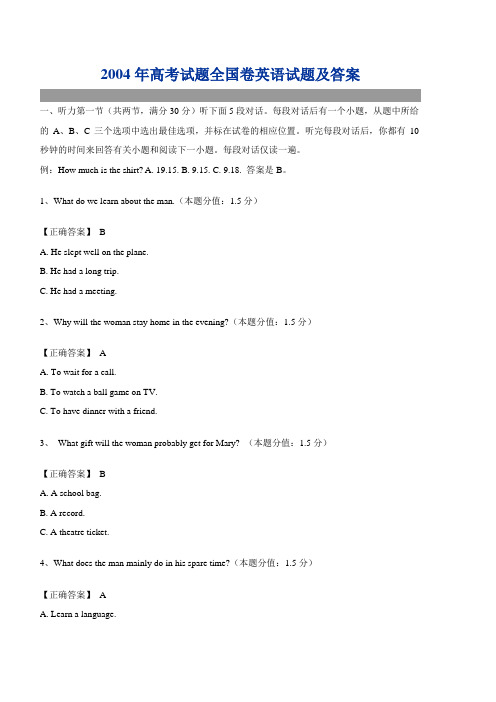
2004年高考试题全国卷英语试题及答案一、听力第一节(共两节,满分30分)听下面5段对话。
每段对话后有一个小题,从题中所给的A、B、C三个选项中选出最佳选项,并标在试卷的相应位置。
听完每段对话后,你都有10秒钟的时间来回答有关小题和阅读下一小题。
每段对话仅读一遍。
例:How much is the shirt? A. 19.15. B. 9.15. C. 9.18. 答案是B。
1、What do we learn about the man.(本题分值:1.5分)【正确答案】 BA. He slept well on the plane.B. He had a long trip.C. He had a meeting.2、Why will the woman stay home in the evening?(本题分值:1.5分)【正确答案】 AA. To wait for a call.B. To watch a ball game on TV.C. To have dinner with a friend.3、What gift will the woman probably get for Mary? (本题分值:1.5分)【正确答案】 BA. A school bag.B. A record.C. A theatre ticket.4、What does the man mainly do in his spare time?(本题分值:1.5分)【正确答案】 AA. Learn a language.B. Do some sports.C. Play the piano.5、What did the woman like doing when she was young?(本题分值:1.5分)【正确答案】 CA. Riding a bicycle with friends.B. Travelling the country.C. Reading alone.二、听力第二节(共15小题,每小题1.5分,满分22.5分)听下面5段对话或独白。
2024年高考英语真题全国卷1卷题答案听力原文
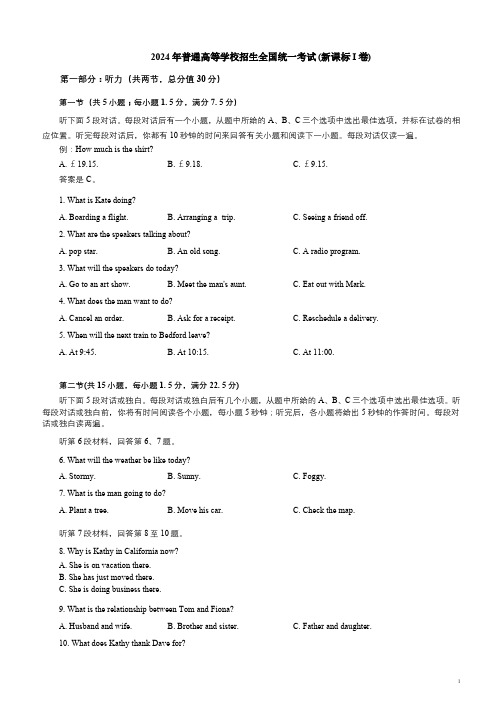
2024年普通髙等学校招生全国统一考试 (新课标I卷) 第一部分:听力(共两节,总分值30分)第一节(共5小题;每小题1. 5分,满分7. 5分)听下面5段对话。
每段对话后有一个小题,从题中所给的A、B、C三个选项中选出最佳选项,并标在试卷的相应位置。
听完每段对话后,你都有10秒钟的时间来回答有关小题和阅读下一小题。
每段对话仅读一遍。
例:How much is the shirt?A. £19.15.B. £9.18.C. £9.15.答案是C。
1. What is Kate doing?A. Boarding a flight.B. Arranging a trip.C. Seeing a friend off.2. What are the speakers talking about?A. pop star.B. An old song.C. A radio program.3. What will the speakers do today?A. Go to an art show.B. Meet the man's aunt.C. Eat out with Mark.4. What does the man want to do?A. Cancel an order.B. Ask for a receipt.C. Reschedule a delivery.5. When will the next train to Bedford leave?A. At 9:45.B. At 10:15.C. At 11:00.第二节(共15小题,每小题1. 5分,满分22. 5分)听下面5段对话或独白。
每段对话或独白后有几个小题,从题中所给的A、B、C三个选项中选出最佳选项。
听每段对话或独白前,你将有时间阅读各个小题,每小题5秒钟;听完后,各小题将给出5秒钟的作答时间。
每段对话或独白读两遍。
2004年高考英语听力原文-试题-答案--2卷
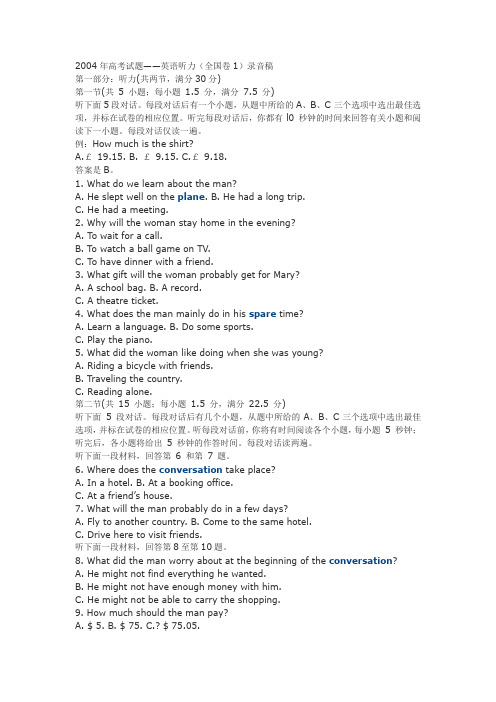
2004年高考试题——英语听力(全国卷1)录音稿第一部分:听力(共两节,满分30分)第一节(共5 小题;每小题 1.5 分,满分7.5 分)听下面5段对话。
每段对话后有一个小题,从题中所给的A、B、C 三个选项中选出最佳选项,并标在试卷的相应位置。
听完每段对话后,你都有 l0 秒钟的时间来回答有关小题和阅读下一小题。
每段对话仅读一遍。
例:How much is the shirt?A.£19.15.B. £9.15.C.£9.18.答案是B。
1. What do we learn about the man?A. He slept well on the plane.B. He had a long trip.C. He had a meeting.2. Why will the woman stay home in the evening?A. To wait for a call.B. To watch a ball game on TV.C. To have dinner with a friend.3. What gift will the woman probably get for Mary?A. A school bag.B. A record.C. A theatre ticket.4. What does the man mainly do in his spare time?A. Learn a language.B. Do some sports.C. Play the piano.5. What did the woman like doing when she was young?A. Riding a bicycle with friends.B. Traveling the country.C. Reading alone.第二节(共15 小题;每小题1.5 分,满分22.5 分)听下面 5 段对话。
2004年高考试题——英语听力(全国卷2-吉林-黑龙江-云南-贵州-四川)录音稿
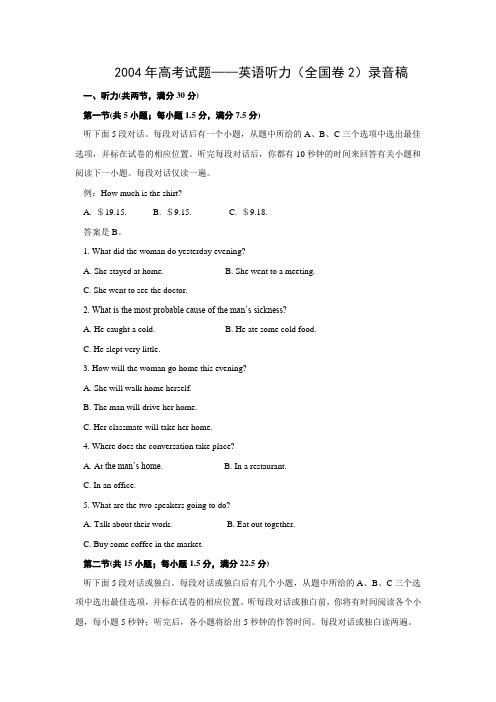
2004年高考试题——英语听力(全国卷2)录音稿一、听力(共两节,满分30分)第一节(共5小题;每小题1.5分,满分7.5分)听下面5段对话。
每段对话后有一个小题,从题中所给的A、B、C三个选项中选出最佳选项,并标在试卷的相应位置。
听完每段对话后,你都有10秒钟的时间来回答有关小题和阅读下一小题。
每段对话仅读一遍。
例:How much is the shirt?A. $19.15.B. $9.15.C. $9.18.答案是B。
1. What did the woman do yesterday evening?A. She stayed at home.B. She went to a meeting.C. She went to see the doctor.2. What is the most probable cause of the man’s sickness?A. He caught a cold.B. He ate some cold food.C. He slept very little.3. How will the woman go home this evening?A. She will walk home herself.B. The man will drive her home.C. Her classmate will take her home.4. Where does the conversation take place?A. At the man’s home.B. In a restaurant.C. In an office.5. What are the two speakers going to do?A. Talk about their work.B. Eat out together.C. Buy some coffee in the market.第二节(共15小题;每小题1.5分,满分22.5分)听下面5段对话或独白。
04-07全国真题听力原文
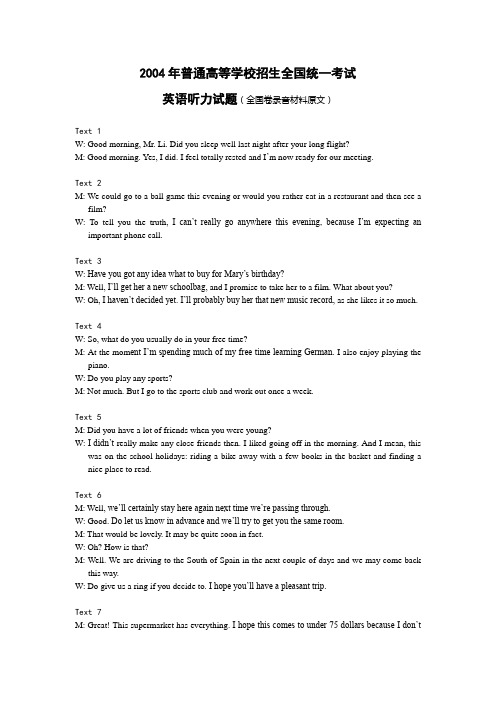
2004年普通高等学校招生全国统一考试英语听力试题(全国卷录音材料原文)Text 1W: Good morning, Mr. Li. Did you sleep well last night after your long flight?M: Good morning. Yes, I did. I feel totally rested and I’m now ready for our meeting.Text 2M: We could go to a ball game this evening or would you rather eat in a restaurant and then see a film?W: To tell you the truth, I can’t really go anywhere this evening,because I’m expecting an important phone call.Text 3W: Have you got any idea what to buy for Mary’s birthday?M: Well, I’ll get her a new schoolbag, and I promise to take her to a film. What about you?W: Oh, I haven’t decided yet. I’ll probably buy her that new music record, as she likes it so much.Text 4W: So, what do you usually do in your free time?M: At the mom ent I’m spending much of my free time learning German. I also enjoy playing the piano.W: Do you play any sports?M: Not much. But I go to the sports club and work out once a week.Text 5M: Did you have a lot of friends when you were young?W: I didn’t really make any close friends then. I liked going off in the morning. And I mean, this was on the school holidays: riding a bike away with a few books in the basket and finding a nice place to read.Text 6M: Well, we’ll certainly stay here again next time we’re passing through.W: Good. Do let us know in advance and we’ll try to get you the same room.M: That would be lovely. It may be quite soon in fact.W: Oh? How is that?M: Well. We are driving to the South of Spain in the next couple of days and we may come back this way.W: Do give us a ring if you decide to. I hope you’ll have a pleasant trip.Text 7M: Great! This supermarket has everything. I hope this comes to under 75 dollars because I don’thave much money left.W: That comes to 75 dollars and 5 cents.M: I knew it. I knew I’d be over.W: Well. Don’t worry about the 5 cents. That’ll do. Have a nice day.M: Well. Thank you. See you again.Text 8W: John, I thought you were going to leave early today to take your son to the show.M: I’m still planning to. But I can’t leave until I finish typing all the letters.W: Can you leave that until tomorrow?M: No. The boss wants them first thing tomorrow morning.W: How many have you got left?M: About five.W: Why don’t you just go ahead, John? I’ll do the letters for you.M: Thank you very much, Janet. You’re so kind.Text 9M: Customer Service. Andy Grant speaking. How may I help you?W: I can’t believe this is happening. I called and ordered a 32-inch bag last Friday. But today I found that you sent a 24-inch one. I was planning to use that bag during our vacation in Mexico, b ut it doesn’t seem possible any more because we will take off on Saturday. It’s only two days away. What am I supposed to do?M: I’m really sorry, madam. I’ll che ck right away. Would you please tell me your order number? W: It’s CE2938.M: Just a minute. I do apologize, madam. There did seem to be a mistake. I’ll have the correct size bag sent to you by overnight mail right away. It will arrive in time for your Saturday trip.Again I apologize for any inconvenience caused by our mistake. I promise it won’t happen again.W: OK. Well. Thank you.M: Thank you, madam, for choosing Linch mail. I hope you will have a wonderful vacation.Text 10M: Juliet, you chose not to go to college. Why? Was it about money?W: Well. I don’t want to sit here and say I was too poor to go to college. But the fact is that we didn’t have the money, though my mum probably could have made enough somehow. I probably could have worked harder at school and gotten better grades, so, it i sn’t really, I didn’t get to go to college. I wished to go to school every other week. It just wasn’t my path. M: At the time did you feel that you were missing something?W: My best friend went off to university and I just remember every time I talked to her, it all sounded so fun and so great. Here I was selling tennis shoes and getting on the bus every day to work in town. We both thought the other’s li fe was so much more exciting. I was trying hard to made enough to pay for my own flat every two months and that seemed so exciting to her.And she would talk about studying for finals, and going to parties, and I thought, God, she is so perfect.答案:1—5 BABAC 6—10 ABBCA 11—15 CBCAC 16—20 CACBB2005年普通高等学校招生全国统一考试英语听力试题(全国卷录音材料原文)Text 1W: Very nice skirts. How much are they?M: Ten dollars each and one dollar off if you buy two. They are on sale.Text 2M: I know you want to talk about this report but I’d like to tell you about my new computer. W: Let’s keep to the point. We can talk about that later. All right?M: OK.Text 3W: Bill, that’s a lovely painting in your living room.M: I’m glad you like it. It’s a Christmas gift from my son.W: Well, it’s beautifu l. Your son has very good taste.Text 4M: So, how is your new roommate?W: She really makes me angry.M: What happened?W: She’s always making loud noises at midnight. When I remind her, she is always rude.Text 5W: Excuse me, I’m looking for Mr. Town.M: Oh, he is not on this floor. He’s on the fourth floor. Go down the stairs and turn left.Text 6M: Did you finish typing that report?W: Yes, I did. But I worked late.M: It must be a long report, I guess.W: Exactly. Twelve pages. I spent three hours on it.M: By the way, what time did you go home?W: I left the office at about 9 o’clock. I got home at ten.M: What did you have for dinner?W: I sent out for a sandwich and I ate it at my desk.Text 7M: Ricky, what’s going on? Fred told me just now that you’re going to leave us.W: Yes. I feel really bad about it. But BMD came up with a really good offer.M: Well, I didn’t know that you were looking for a new job.W: Well, just between you and me, I think we have some real problems in this department. Don’t get me wrong. It has nothing to do with you, Frank. Everybody says that you’re an excellent manager.M: Problems? What problems? Do we have time to talk about it?Text 8W: You know, I’ve just finished some very interesting research for the newspaper about things people do in their spare time.M: Really? What did you learn?W: Well, I talked to 20 people, and 19 of them watch TV.M: That’s interesting. I never watch it. D o you?W: Not much. Anyway, about half of them, 9 people play some kind of sport.M: I’m not surprised. P eople are getting more exercise these days.W: Yes. A few of them go to movies.M: Mm, I do, too.W: But here is the most interesting result. Only one of them reads.M: That’s terrible.Text 9M: Excuse me, do you mind if I sit here?W: Not at all, go ahead.M: Thanks.W: Are you going somewhere or are you meeting someone?M: I’m on my way to Washington, and you?W: I’m on my way to San Francisco.M: Really? I think San Francisco is probably the most exciting place in the US.W: So do I. No other city has as many good restaurants or as much good music.M: Is San Francisco your hometown?W: No, I’m from a very small town in Pennsylvania. I wouldn’t want t o live there again either. I don’t like small town living very much.M: En, neither do I really. But small towns have their advantages, less traffic.W: And friendly people. You know I’m beginning to feel homesick. By the way, where are you from?M: China.W: China? But you speak English like a native speaker. I didn’t have any idea.M: Oh, excuse me. It’s time for my flight. Well, nice talking with you.W: You too. Bye.Text 10M: Could you suggest some ways to bring family members close together?W: Well, I feel it is very important for families to have regular meals together. One of my good childhood memories was dinner with my parents and two sisters. Because my husband and I both work and our three children are busy with their studies, we seldom have the chance to get together as a family. But we thought it would be possible for us to sit down and enjoy mealstogether every week. First, we tried setting three fixed dates: Mondays, Wednesdays and Fridays. But almost everyone was unhappy. Then my son had the idea that everyone tell me his or her most convenient days and I would choose the two best days. For a while, the children were still unhappy with the idea. They said they would rather spend the time with their friends playing sports. Gradually though they began to see these evenings together as interesting and helpful. We laughed a lot, we made plans for trips. We discussed each other’s problems. After a couple of months, anyone who had to miss a family meal felt regretful. And now we all feel that we have been able to build much stronger relationships within the family than we had before.答案:1—5 BACBC 6—10 ABABC11—15 ACABA 16—20 ACBBC2006年普通高等学校招生全国统一考试英语听力试题(全国卷录音材料原文)Text lM: How much are the tickets?W: They are 15 pounds each, but student tickets are half price.M: Could I have two student tickets please?Text 2M: Excuse me, I just want to check the boarding gate for BAl6 to London, is it Gate 22?W: Oh it’s just changed, Gate 25, down that way on the right.M: Thanks.Text 3W: Do you live very far from your school?M: About 8 kilometers, but it doesn’t seem very far; there is much traffic along this road. It’s great to go by bike.Text 4W: Now, can we get the computer before Wednesday?M: Well, it depends, if it is less than 10 kilometers, we can deliver it on Tuesday, but if it is further away, it will be on Thursday. Where is your office?W: Just around the corner.Text 5W: You can’t wear that John, it’s black.M: What’s wrong with a black shirt? Everybody has a black shirt.W: It doesn’t look like you’re going to a party.Text 6M: Hello, may I speak to Mr. Brown?W: I am sorry, he is out for lunch. Would you like to leave a message?M: En, what time do you expect him back?W: Say, in half an hour.M: Thank you, I’ll try back later.Text 7W: Welcome to Youth Hotel, can I help you?M: I’d like a room for a night.W: Would you like a single room, a double room or a room for three?M: Oh, a single room please. Can I pay by cheque?W: Sure, fill in this form please.M: Need my student card number?W: No, just your address and telephone number.M: Ok, here is the form.W: Very well, here is your key to room 212.M: Thank you!W: Have a good stay!Text 8M: Hi, you must be that new secretary, welcome! I’m Tom Robison from public relations.W: Hi, Mr. Robison. Thanks. I’m Lisa Jones, working in sales now.M: Please call me Tom, Lisa.W: OK, Tom. Have you worked here long?M: Yes, over 20 years.W: Well, that’s a long time. Do you enjoy working here?M: Well, yes. I suppose I like this job because the money is good, and it’s a good place to work in, but to be honest, what I really enjoy is the chance to go abroad, just visiting other countries.That’s the best thing.W: That’s true, for me the best thing about working here is that I live close to the office, I can go home for lunch, and I don’t have to worry about traffic.Text 9M: Now, Kathy, do you know when the visitors from India are coming?W: We offer them three choices: the end of March, the middle of April and the beginning of May, and they choose the earliest one which is good actually with exams coming up in May.M: And how many are coming? Did you say about 12?W: Yes, they said 12 at first, but changed it to 10 this morning.M: Good, we have 8 weeks to prepare; here are my suggestions. On the first day, a welcome party, then they can visit the schools in the district on the second and third days.W: We have got to remember this group wants to look at how computers are being used in the classroom.M: Exactly, so I want to ask Mr. Goodman to give them a talk on this on the afternoon of the third day.W: That will fit very nicely.M: And on the last day, they would do some sightseeing, we could take them on the tour of London but many of them may have been there already, and Scotland will be too far away. W: Why not take them for a walk along the coast? It should be interesting.M: Good idea! Kathy, I’m sure they’ll like it.Text 10W: There are many interesting stories about how a baby learns to say its first word. Now, Mike, would your like to share your story with us?M: Ok, here’s my story, I was about 18 months old I think and I had just started to say my first word. Every time a truck went by, I would shout a word that sounded like truck, but to everyone else, it sounded nothing like it. My parents tried to correct me, but failed. Then,about three months later, we traveled to New York. As we were waiting for our plane at the airport, I looked out of a huge window. At that very moment I saw the largest truck in the world. I had to tell someone about this. I turned to my father who was standing next to a thousand people waiting for various flights and screamed truck! Truck! My father tried hard to shut me up, but I was so excited, I kept screaming my special word. My poor mother decided she didn’t know this baby and ran into the ladies’ room where she hid until I finally stopped.Well, I learned how to say truck correctly, and soon I was talking like a normal child. However, my parents will never forget the very first word I produced in my life.答案:1—5 BCAAC 6—10 CAACA 11—15 BBABB 16—20 CABBC2007年普通高等学校招生英语听力试题英语听力试题(全国卷录音材料原文)Text 1W: John, is Mark coming for tea tomorrow?M: Yes. I told you yesterday, Tracy.W: Oh, did you? Sorry, I must have forgotten.Text 2W: What’s the hurry? We’d like you to stay for dinner.M: Well, thank you, but Helen and I have to meet my parents at the railway station.Text 3W: Hi, Tom, we had to start the meeting without you.M: I know, my flight was delayed because of the heavy rain.W: But you are just in time for the discussion.Text 4M: How much are these shoes?W: Oh, they are 35 dollars a pair.M: Do you have size 9?W: I am afraid they are sold out.Text 5M: Hi, I am thinking of taking a trip during the Christmas holidays.W: Where would you like to go?M: Well, maybe somewhere warm and sunny.W: How about a tour to Southeast Asia?Text 6M: Ladies and gentlemen, let’s welcome Jane Car ter. Jane, you are so young, how can you sing so well?W: Well, Mr. Green, I like singing very much and I’ve been doing this for a while. Above all, I have Mr. James as my teacher.M: No wonder. I believe you’ll do a wonderful job tonight. Now, ladies and gentlemen, Jane Carter.Text 7W: Happy birthday, Jimmy, are you ready for the next present?M: You mean there is more besides the watch?W: Come with us, it’s in the car. Now, here we are, you’ve been talking about this for a month. M: Oh, it’s a new computer. It’s just what I want. I am so happy about it, thank you so much, Momand Dad.Text 8W: Excuse me, sir.M: Can I help you?W: My name is Jane Smith; I am a designer looking for a job.M: See my secretary; she will set you up with a test.W: When?M: Next month.W: I can’t wait that long.M: Excuse me?W: I can’t wait a month, I need something sooner.M: I am sorry.Text 9M: Hi, Lily, how is your new flat?W: It’s great, I really like it.M: How big is it?W: It’s one big room, but it has a bathroom and a small kitchen too.M: How far is it from the office?W: It’s only about 10 minutes.M: 10 minutes by bus or by car?W: On foot. I walked to work this morning. I was 10 minutes early.M: You are lucky. I was 10 minutes late.W: What happened?M: All the buses came late.W: What did Susan say?M: She was late too.W: What happened to her?M: She took the train and it was late too.W: Well, then, you were really lucky after all. But what are you going to do tomorrow?M: I’ll start out 15 minutes earlier.Text 10Good afternoon everybody and welcome to this class on English words. I hope that all of you can hear me. If not, please let me know. I am Professor John Morris. I’ll be your teacher for the next 13 weeks. As you can probably tell, this is one of the most popular and crowded classes. Indeed, every time this course is offered, this room is very full. Why is that? Well, in order to use the English language, it’s very important to have at least a basic understanding of how words are formed. Just to mention one figure and there are many, there are about 1 million words in English. If you are an English learner, you may wonder how you can possibly remember all of these words. Well, for one thing, you don’t have to. No native speaker exists who knows all of the words in the English language. Besides, there are short-cuts. Short-cuts? Yes, for example, if you know how words are formed by using parts of words from other languages, such as Greek and French, you’llunderstand a good number of English words when you first come across them. Let me put it this way, knowing the rules will help you to master a large number of words. This is probably the NO.1 reason why this class is so popular.答案:1—5 BBBBC 6—10 CACBA 11—15 ACAAB 16—20 CAACC。
2004年上海高考英语真题试卷(答案版,含听力原文)
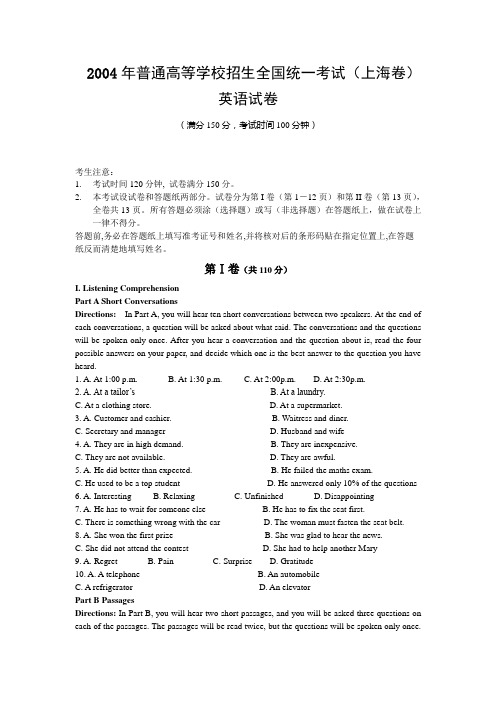
2004年普通高等学校招生全国统一考试(上海卷)英语试卷(满分150分,考试时间100分钟)考生注意:1.考试时间120分钟, 试卷满分150分。
2.本考试设试卷和答题纸两部分。
试卷分为第I卷(第1-12页)和第II卷(第13页),全卷共13页。
所有答题必须涂(选择题)或写(非选择题)在答题纸上,做在试卷上一律不得分。
答题前,务必在答题纸上填写准考证号和姓名,并将核对后的条形码贴在指定位置上,在答题纸反而清楚地填写姓名。
第Ⅰ卷(共110分)I. Listening ComprehensionPart A Short ConversationsDirections: In Part A, you will hear ten short conversations between two speakers. At the end of each conversations, a question will be asked about what said. The conversations and the questions will be spoken only once. After you hear a conversation and the question about is, read the four possible answers on your paper, and decide which one is the best answer to the question you have heard.1. A. At 1:00 p.m. B. At 1:30 p.m. C. At 2:00p.m. D. At 2:30p.m.2. A. At a tailor’s B. At a laundry.C. At a clothing store.D. At a supermarket.3. A. Customer and cashier. B. Waitress and diner.C. Secretary and managerD. Husband and wife4. A. They are in high demand. B. They are inexpensive.C. They are not available.D. They are awful.5. A. He did better than expected. B. He failed the maths exam.C. He used to be a top studentD. He answered only 10% of the questions6. A. Interesting B. Relaxing C. Unfinished D. Disappointing7. A. He has to wait for someone else B. He has to fix the seat first.C. There is something wrong with the carD. The woman must fasten the seat belt.8. A. She won the first prize B. She was glad to hear the news.C. She did not attend the contestD. She had to help another Mary9. A. Regret B. Pain C. Surprise D. Gratitude10. A. A telephone B. An automobileC. A refrigeratorD. An elevatorPart B PassagesDirections: In Part B, you will hear two short passages, and you will be asked three questions on each of the passages. The passages will be read twice, but the questions will be spoken only once.When you hear a question, read the four possible answers on your paper and decide which one would be the best answer to the question you have heard.Question 11 through 13 are based on the following passage.11. A. Disappointed B. Satisfied C. Angry D. Worried12. A. He checked out and left the hotel B. All his things were stolenC. His luggage was removed by mistakeD. He was robbed of his suitcase.13. A. He was asked to leave the hotelB. The receptionist was rude to himC. All his things were in disorder.D. He was sent to a dirty room14. A. To inform parents and schools B. To pick out good studentsC. To compare teachersD. To expose poor schools.15. A. They have no trust in doctors B. They cannot afford the medical fee.C. They fear things like injectionsD. They doubt the medical treatment16. A. Teacher’s difficult life. B. Harm of divorce to families.C. Ways to become loveable kidsD. Kid’s attention-seeking behaviourPart C Longer ConversationsDirections: In Part C, you will hear two longer conversations. The conversations will be read twice. After you hear each conversation, you are required to fill in the numbered blanks with the information you have heard. Write your answers on your answer sheet.Blanks 17 through 20 are based on the following conversationComplete the form. Write NO MORE THAN THREE WORDS for each answer.Ⅱ. GrammarDirections: Beneath each of the following sentences there are four choices maker A, B, C and D. Choose the one answer that best completes the sentence.25. The accident is reported to have occurred __________ the first Sunday in February.A. atB. onC. inD. to26. I had to buy _________ these books because I didn’t know which one was the best.A. bothB. noneC. neitherD. all27. According to a recent U.S. survey, children spent up to 25 hours a week _________ TV.A. to watchB. to watchingC. watchingD. watch28. Children under 12 years of age in that country ________ be under adult supervision when is a public library.A. mustB. mayC. canD. need29. The first use of atomic weapons was in 1945. and their power ______ increased enormously ever since.A. isB. wasC. has beenD. had been30. The number of deaths form heart disease will be reduced greatly it people _______ to eat more fruit and vegetables.A. persuadeB. will persuadeC. be persuaded C. are persuaded31. Bill’s aim is to inform the viewers that cigarette advertising on TV is illegal, _______?A. isn’t itB. is itC. isn’t beD. is he32. He speaks English well indeed, but of course not _____ a native speaker.A. as fluent asB. more fluent thanC. so fluently asD. much fluently than33. The flu is believed _______ by viruses that like to reproduce in the cells inside the human nose and throat.A. causingB. being causedC. to be causedD. be have caused34. The flowers ____ sweet in the botanic garden attract the visitors to the beauty of nature.A. to smellB. smellingC. smeltD. to be smelt35. The disc, digitally ______ in the studio, sounded fantastic at the party that night.A. recordedB. recordingC. to be recorded C. having recorded36. American women usually identify their best friend as someone _____ they can talk frequently.A. whoB. asC. about whichD. with whom37. After Yang Li wei succeeded in circling the carth, _______ our astronauts desire to do is walk in space.A. whereB. whatC. thatD. how38. Jasmine was holidaying with her family in a wildlife park _____ she was bitten on the leg by al lion.A. whenB. whileC. sinceD. once39. Parents should take seriously their children’s requests for sunglasses _________ eye protection is necessary in sunny weather.A. becauseB. throughC. unlessD. if40. A story goes ______ Elizabeth I of England liked nothing more that being surrounded by clever and qualified noblemen at court.A. whenB. whereC. whatD. that41. ____ snacks and drinks, but they also brought cards for entertainment when they had a picnic in the forest.A. Not only they broughtB. Not only did they bringC. Not only brought theyD. Not only they did bring42. Having been attacked by terrorists, ________.A. doctors cane to their rescueB. the tall building collapsedC. an emergency measure was takenD. warnings were given to tourists43. Why! I have nothing to confess. _______ you want me to say?A. What is it thatB. What it is thatC. How is it thatD. How it is that44.——English has large vocabulary, hasn’t it?—Yes, _________ more words and expressions and you will find it easier to read and communicate.A. KnowB. KnowingC. To knowD. KnownⅢ. VocabularyDirections: Beneath each of the following sentences there and four choices marked A, B, C and D. Choose the one answer that best completes the sentence.45. The environmentalists and wild goats’ _________ on the vast grasslands was a good indication of the better environment.A. escapeB. absenceC. attendanceD. appearance46. Hospital staff burst into cheers after doctors completed a 20-hours operation to have __________ one-year-old twins at the head.A. isolatedB. separatedC. divided C. removed47. After the trainer was sure that the whale could look after itself, he ________it into the sea.A. transportedB. unloadedC. releasedD. handled48. In ___________ Chinese culture, marriage decisions were often made by parents for their children.A. traditionalB. historicC. remoteD. initial49. Some people like dirking coffee, for it has _______ effects.A. promotingB. stimulatingC. enhancingD. encouraging50. The teacher wrote an example on the blackboard to ________ to point.A. illustrateB. suggestC. expressD. recognize51. Most people on this island are recreational fishers, and ________, fishing forms an actual part of their leisure time.A. accidentallyB. purposefullyC. obviouslyD. formally52. In dealing with public relations, we should make every effort to prevent the _____ in personality.A. contactB. contrastC. connectionD. conflict53. Chinese arts have won the _________ of a lot of people outside China.A. enjoymentB. appreciation C, entertainment D. reputation54. To keep healthy, Professor Johnson________ cycling as a regular form of exercise after he retired.A. took upB. caught onC. carried outD. made forⅣ。
2004年高考英语全国卷IV听力试题暨听力原文

2004年高考英语全国卷IV听力试题暨听力原文第一部分听力理解(共两节,满分30分)第一节(共5小题,每小题1.5分,满分7.5分)听下面5段对话。
每段对话后有一个小题,从题中所给的A、B、C三个选项中选出最佳选项,并标在试卷的相应位置。
听完每段对话后,你都有10秒钟的时间来回答有关小题和阅读下一小题。
每段对话仅读一遍。
1. What does the man mean?A. He wants to know the time.B. He offers to give a lecture.C. He agrees to help the woman.2. What will the man probably do after the conversation?A. Wait there.B. Find a seat.C. Sit down.3. Who are the speakers talking about?A. An actor.B. A writer.C. A tennis player.4. Where does the conversation most probably take place?A. On a farm.B. In a restaurant.C. In a market.5. What does the man agree to do after a while?A. Take a break.B. Talk about his troubles.C. Meet some friends.第二节(共15小题;每小题1.5分,满分22.5分)听下面5段对话或独白。
每段对话或独白后有几个小题,从题中所给的A、B、C三个选项中选出最佳选项,并标在试卷的相应位置。
听每段对话或独白前,你将有时间阅读各个小题,每小题5秒钟;听完后,各小题将给出5秒钟的作答时间。
每段对话或独白读两遍。
2004--2016年全国卷高考听力真题

2004-2016年全国卷高考英语听力真题2004年高考英语听力(全国1)试题第一部分听力(共两节,满分30分)做题时,先将答案标在试卷上。
录音内容结束后,你将有两分钟的时间将试卷上的答案转涂到答题卡上。
第一节(共5小题;每小题1.5分,满分7.5分)听下面5段对话。
每段对话后有一个小题,从题中所给的A、B、C三个选项中选出最佳选项,并标在试卷的相应位置。
听完每段对话后,你都有10秒钟的时间来回答有关小题和阅读下一小题。
每段对话仅读一遍。
例:How much is the shirt? A. 19.15. B. 9.15. C. 9.18. 答案是B。
1. What do we learn about the man.A. He slept well on the plane.B. He had a long trip.C. He had a meeting.2.Why will the woman stay home in the evening?A. To wait for a call.B. To watch a ball game on TV.C. To have dinner with a friend.3. What gift will the woman probably get for Mary?A. A school bag.B. A record.C. A theatre ticket.4.What does the man mainly do in his spare time?A. Learn a language.B. Do some sports.C. Play the piano.5.What did the woman like doing when she was young?A. Riding a bicycle with friends.B. Travelling the country.C. Reading alone.二、听力第二节(共15小题,每小题1.5分,满分22.5分)听下面5段对话或独白。
2004年高考试题——英语听力(重庆卷)录音稿
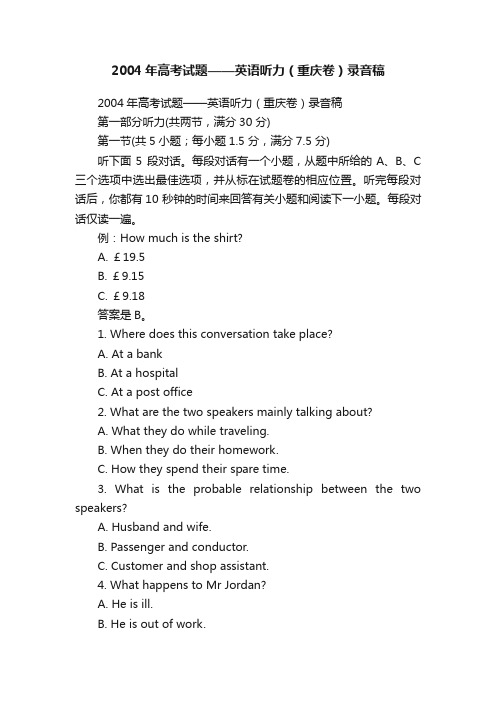
2004年高考试题——英语听力(重庆卷)录音稿2004年高考试题——英语听力(重庆卷)录音稿第一部分听力(共两节,满分30 分)第一节(共5小题;每小题1.5 分,满分7.5 分)听下面5 段对话。
每段对话有一个小题,从题中所给的A、B、C 三个选项中选出最佳选项,并从标在试题卷的相应位置。
听完每段对话后,你都有10 秒钟的时间来回答有关小题和阅读下一小题。
每段对话仅读一遍。
例:How much is the shirt?A. £19.5B. £9.15C. £9.18答案是B。
1. Where does this conversation take place?A. At a bankB. At a hospitalC. At a post office2. What are the two speakers mainly talking about?A. What they do while traveling.B. When they do their homework.C. How they spend their spare time.3. What is the probable relationship between the two speakers?A. Husband and wife.B. Passenger and conductor.C. Customer and shop assistant.4. What happens to Mr Jordan?A. He is ill.B. He is out of work.C. He is on holiday.5. What does the woman mean?A. She wants to go on watching TV.B. She wants the man to turn the TV off.C. She does not mind what the man will do.第二节(共15 小题;每小题 1.5 分,满分22.5 分)听下面5 段对话或独白。
2004年英语听力(全国卷II)听力原文
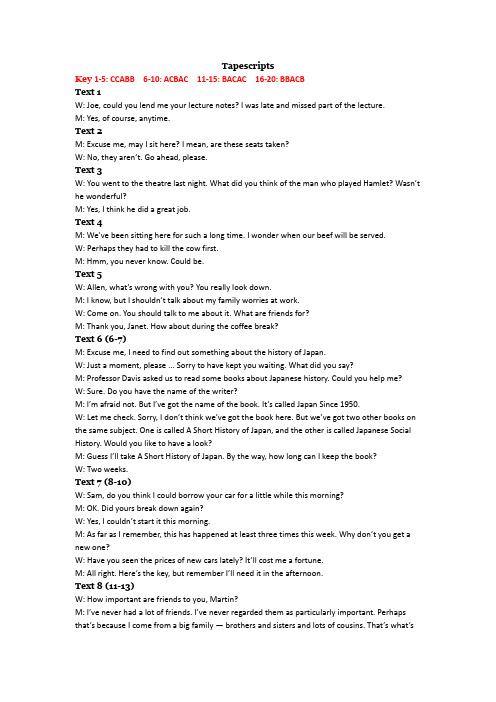
TapescriptsKey 1-5: CCABB 6-10: ACBAC 11-15: BACAC 16-20: BBACBText 1W: Joe, could you lend me your lecture notes? I was late and missed part of the lecture.M: Yes, of course, anytime.Text 2M: Excuse me, may I sit here? I mean, are these seats taken?W: No, they aren’t. Go ahead, please.Text 3W: You went to the theatre last night. What did you think of the man who played Hamlet? Wasn’t he wonderful?M: Yes, I think he did a great job.Text 4M: We’ve been sitting here for such a long time. I wonder when our beef will be served.W: Perhaps they had to kill the cow first.M: Hmm, you never know. Could be.Text 5W: Allen, what’s wrong with you? You really look down.M: I know, but I shouldn’t talk about my family worries at work.W: Come on. You should talk to me about it. What are friends for?M: Thank you, Janet. How about during the coffee break?Text 6 (6-7)M: Excuse me, I need to find out something about the history of Japan.W: Just a moment, please ... Sorry to have kept you waiting. What did you say?M: Professor Davis asked us to read some books about Japanese history. Could you help me? W: Sure. Do you have the name of the writer?M: I’m afraid not. But I’ve got the name of the book. It’s called Japan Since 1950.W: Let me check. Sorry, I don’t think we’ve got the book here. But we’ve got two other books on the same subject. One is called A Short History of Japan, and the other is called Japanese Social History. Would you like to have a look?M: Guess I’ll take A Short History of Japan. By the way, how long can I keep the book?W: Two weeks.Text 7 (8-10)W: Sam, do you think I could borrow your car for a little while this morning?M: OK. Did yours break down again?W: Yes, I couldn’t start it this morning.M: As far as I remember, this has happened at least three times this week. Why don’t you get a new one?W: Have you seen the prices of new cars lately? It’ll cost me a fortune.M: All right. Here’s the key, but remember I’ll need it in the afternoon.Text 8 (11-13)W: How important are friends to you, Martin?M: I’ve never had a lot of friends. I’ve never regarded them as particularly important. Perhaps that’s because I come from a big family — brothers and sisters and lots of cousins. That’s what’sreally important to me. If I really need help, I get it from them. Well, at least that’s what I’ve found. What about you, Jean?W: To me, friendship ... having friends ... people I know I can really trust ... to me that’s the most important thing in life. It’s more important even than love. If you love someone, you can always fall out of love again, and that can lead to a lot of bad feelings, bitterness, and so on. But a good friend is a friend for life.M: What do you really mean by a friend?W: Well, I’ve already said, someone you know you can trust. I suppose what I really mean is ... let me see ... how am I going to put this ... it’s someone who will help you if you need help, who’ll listen to you when you talk about your problems. I suppose that’s a real friend.Text 9 (14-17)W: Imagine seeing you here, Johnson. Weren’t you supposed to away on holiday?M: Well, Linda and I were about leave for the beach when her brother Tony called saying his family were coming for the weekend. So we stayed behind and spent the weekend with the family, swimming in the pool, walking in the woods and going shopping.W: Sounds like fun.M: Yeah. They liked it here so much that they decided to stay a bit longer, for the whole week. So we ended up going nowhere.W: I’m not surprised. We had exactly the same experience two months ago. My aunt came over for a visit, and so instead of going on the planned camping holiday, Tom and I just stayed at home. M: It was actually not that bad. So long as I can take a few days off work, I don’t care where we go.Text 10 (18-20)W: I have an aunt in England. She lives in a small town. Last year I went to see her family. I really had a wonderful time there. Everybody knew I was coming and it was my first time in England. We had a party in a club. It was wonderful. Two months ago I came to study in England. I didn’t expect living in a city in England could be so much more expensive than in my home country in Eastern Europe, and the weather here has surprised me, too. People drive on the left side rather than on the right. I am glad I am still alive because I still don’t know how to cross the street. The English buildings and sights are beautiful. I have never lived in a house before in my life. We always lived in flats, in a two-bedroom flat on the fifth floor. If I stay here, it might be possible in the next 15 years to buy my own flat.2014-12-18。
2004年高考试题——英语听力(北京卷)录音稿

2004年高考试题——英语听力(北京卷)录音稿一、听力理解(共两节,满分30分)第一节(共5小题;每小题1.5分,满分7.5分)听下面5段对话。
每段对话后有一道小题,从每题所给的A、B、C三个选项中选出最佳选项。
听完每段对话后,你将有10秒钟的时间来回答有关小题和阅读下一小题。
每段对话你将听一遍。
例:What is the man going to read?A. A newspaper.B. A magazine.C. A book.答案是A。
1. How is the woman going to the airport?A. By taxi.B. By train.C. By bus.2. What is the man’s favorite free-time activity?A. Watching TV.B. Reading a book.C. Listening to music.3. What are they talking about?A. Homework.B. Computer.C. Books.4. Where will the woman first go after work?A. The cinema.B. The market.C. The restaurant.5. What is the woman doing?A. Asking for help.B. Making an apology.C. Expressing dissatisfaction.第二节(共15小题;每小题1.5分,满分22.5分)听下面6段对话或独白。
每段对话或独白后有几道小题,从每题所给的A、B、C三个选项中选出最佳选项。
听每段对话或独白前,你将有5秒钟时间阅读每小题。
听完后,每小题将给出5秒钟的作答时间。
每段对话或独白你将听两遍。
听第6段材料,回答第6至7题。
6. How does the woman feel?A. Ill.B. Tired.C. Nervous.7. Where does the conversation take place?A. At a hospital.B. At an airport.C. At a station.听第7段材料,回答第8至9题。
04年英语专四听力原文和答案

第一部分:听力理解(共两节,满分30分)第一节(共5小题;每小题1.5分,满分7.5分)听下面5段对话。
每段对话后面有一个小题,从题中所给的A、B、C三个选项中选出最佳选项,并标在试卷的相应位置。
听完每段对话后,你都有10秒钟的时间来回答有关小题和阅读下一个小题。
每段对话仅读一遍。
1.Where is Miss Brown from?A.Singapore B.America C.Japan2.What do you know about Bob?A.He is interested in maths.B.He is often absent from class.C.He often does his homework with other’s help.3.What can we learn about the man?A.He couldn’t ride a bike.B.He used to have a bike like the boys.C.He would like to have a bike.4.What is the woman going to do?A.Mail an invitation to the Smiths.B.Invite Alan to the party.C.Visit the Smiths.5.What did the man mean?A.He could lend her an extra pen.B.He had lost his pen.C.He could offer her a pencil.第二节(共15小题;每小题1.5分,满分22.5分)听下面5段对话或独白。
每段对话或独白后有几个小题,从题中所给的A、B、C三个选项中选出最佳答案,并标在试卷的相应位置。
听每段对话或独白前,你将有时间阅读各个小题,每小题5秒钟;听完后,各小题将给出5秒钟的做答时间。
2004年英语听力(全国卷Ⅰ)听力真题+答案
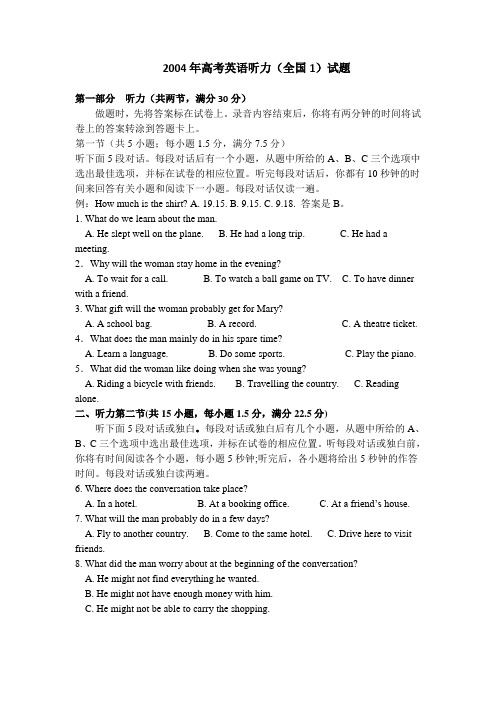
2004年高考英语听力(全国1)试题第一部分听力(共两节,满分30分)做题时,先将答案标在试卷上。
录音内容结束后,你将有两分钟的时间将试卷上的答案转涂到答题卡上。
第一节(共5小题;每小题1.5分,满分7.5分)听下面5段对话。
每段对话后有一个小题,从题中所给的A、B、C三个选项中选出最佳选项,并标在试卷的相应位置。
听完每段对话后,你都有10秒钟的时间来回答有关小题和阅读下一小题。
每段对话仅读一遍。
例:How much is the shirt? A. 19.15. B. 9.15. C. 9.18. 答案是B。
1. What do we learn about the man.A. He slept well on the plane.B. He had a long trip.C. He had a meeting.2.Why will the woman stay home in the evening?A. To wait for a call.B. To watch a ball game on TV.C. To have dinner with a friend.3. What gift will the woman probably get for Mary?A. A school bag.B. A record.C. A theatre ticket. 4.What does the man mainly do in his spare time?A. Learn a language.B. Do some sports.C. Play the piano. 5.What did the woman like doing when she was young?A. Riding a bicycle with friends.B. Travelling the country.C. Reading alone.二、听力第二节(共15小题,每小题1.5分,满分22.5分)听下面5段对话或独白。
- 1、下载文档前请自行甄别文档内容的完整性,平台不提供额外的编辑、内容补充、找答案等附加服务。
- 2、"仅部分预览"的文档,不可在线预览部分如存在完整性等问题,可反馈申请退款(可完整预览的文档不适用该条件!)。
- 3、如文档侵犯您的权益,请联系客服反馈,我们会尽快为您处理(人工客服工作时间:9:00-18:30)。
2014年高考全国卷英语听力材料录音原文
Text1
W:Excuseme.Thisistheaddress.HowdoIfindit?
M:Right.You’llneedastreetmap.Here’sone,andI’llshowyouwhereitis.
Text2
W:Ohmy!Mycarbrokedown,andIhavetomeetmyauntattherailwaystationbeforenoon.
M:You’relucky.Icandropyouoffonmyway.
Text3
W:DidyouhearthatMr.Petersoniscomingnextweek,Gordon?
M:Yes,soIcalledallthedepartmentheadstomyofficethismorning.Weneedtogivehimreportsonourpro gram.?
Text4
W:IhopeyoulikethebookIlentyou.Iwasn’tsureifyou’dbeinterested.
M:Ihadthesamedoubtatfirst.ButonceIstarted,Isimplycouldn’tputitdown.
Text5
W:Whatisgoingon?It’sMay,andwestillhavetowearwarmclothes.
M:Well,there’ssomegoodnewsontheradio.Youprobablycanwearshortstomorrow.
Text6
W:Harry,let’splaysomeping-pongtoday.
M:I’dlovetoplayasetortwo,butmyrightarmhurts.I’vedeci dedtostopplayingping-ponguntilitfeelsbetter .?
W:Well,howaboutgoingskating?
M:I’dliketo,butmykneehurts,too.
W:Harry,stopmakingexcuses!You’rejustlazy.
M:No,I’mnot!Youknow,there’sabasketballmatchonTVtoday.Let’sjuststayhomeandwatchit.?
W:OK.Youstay,andI’llplay withHelen.
Text7
W:Whatdoyouwanttodotonight?
M:Howaboutgoingtothecinema?Ishouldbehomefromworkat5:45.Thenwecangooutandeatbeforew eseeafilm.
W:Whatdoyouwanttosee?
M:There’sagoodartfilmattheGreenHouseCinema.
W:Let’ssee…itstartsat6:15.Idon’tthinkwecangettherein timetoseethebeginning.Howabouttheactio nfilmattheNewStateCinema?Itstartsat6:50.Perhapsthe7:00oneattheUMECinemaisevenbetter.Itst arsJackieChan.
M:OK,that’sfine.Ilikehim,too.
Text8
M:Hey,Lucy.Doyouhavesometimetotalkaboutnextweek’stripwithme?
W:Sure,Dave.
M:OK.So,we’releavingonMondayfromHartsfieldInternationalAirport,andreturningonFriday.Doweta keourselvestotheairport?Maybeweneedtobookataxi,orjustgobybus.
W:No,wedon’thaveto.Thecompanycarwillpickusupandtakeusthere.
M:Oh,that’sgood.When?
W:Ourflightleavesat11:00a.m.,sotheyshouldpickusupbetween8:00and9:00a.m.Besides,thecomp anypaysforourtrip,includinghotelandfood.
M:Howmuchwillthatbe?
W:Well,NewYorkisaprettyexpensivecity.So,eachofuswillget$200aday.
M:Oh,OK.Thanksfortellingmethat.
W:You’rewelcome.
Text9
W:Pleasesitdown.Let’ssee…you’reMr.Smith.Isthatcorrect?
M:Yes.JohnSmith.
W:Andyou’reinterestedinthisjob?
M:Yes,Iam.I’llgraduatefromcollegethecomingJune.MymajorisChinese.
W:Isee.Haveyoueverdoneanyworkinthisfield?
M:Yes,IusedtobeatourguideforChinesetravellers.
W:Good.Now,howmuchmoneydoyouexpecttohaveforayear?
M:FromwhatI’veread,itseemsthatastartingpaywouldbearound$12,000ayear.
W:Here,youwouldstartat$10,500forthefirstyear…akindoftrainingperiod.Thenyouwouldgoto$15,00 0.
M:Thatsoundsfairenough.Whatdoyouthinkarethechancesformetogetajobhere?
W:Well,I’mtalkingtothreepeopletodayandfourtomorrow.We’llbehiringtwopeople.You’llhearfromuss ometimenextmonth.Goodluck!Andthanksforcomingintoday.
Text10
M:Well,I’dlovetosharewithyoumypersonalopinionsoncitylifeandlifeinsmalltowns.Igrewupinasmal lt ownuntilIwas18andthenmovedtoabigcity,soIhaveexperiencedthegoodandbadsidesofboth.Inevert houghtthatIwouldlikelivinginabigcity,butIwaswrong.Aftertenyearsoflivinginone,Ican’timagineeverli vinginasmalltownagain.Surelysmalltownsandbigcitiesbothhavesomeproblemsintermsoftransport. Inasmalltown,youhavetoownacartomakelifecomfortable.Youcan’tgetaroundwithoutonebecauseth ereisn’tanykindofpublictransport.Bigcitiesgenerallyhaveheavytrafficandexpensiveparking,butther eyouhaveachoiceoftakingpublictransport,whichischeaperthan driving.So,ifyoudon’thaveacar,you’dbetterliveinthecity.Ialsolovetheexcitinglifeinbigcities.Icanalwaysenjoyalotoffilms,concerts,andoth erwonderfulshows.However,thesethingsarenotcommoninsmalltowns.ThefinalthingIlikeaboutlarge citiesisthatyoucanmeetdifferentkindsofpeople.However,youseldomfindsuchavarietyofpeopleinas mallertown.Ithinkthatlivinginanareawhereeveryonewasjustlikemewouldquicklybecomedull.Ofcour se,safetyshouldbeconsidered,andthat’soneareawheresmalltownsarebetterthanbigcities.Still,Iwou ldratherbeabitmorecarefulandliveinalargecitythantofeelsafebutdull.。
